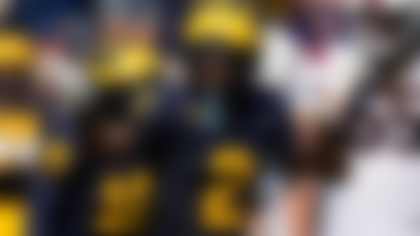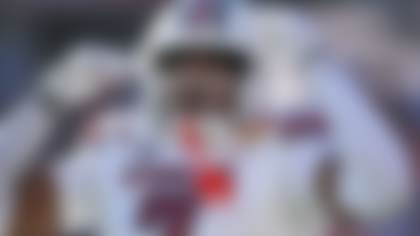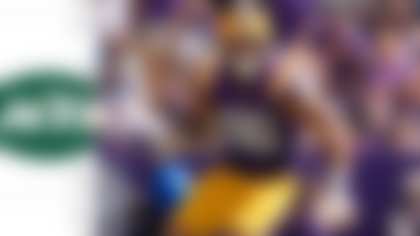Franchise quarterback is the most elusive and essential need in all of pro football. 国产外流网teams are desperate to find one, willing to part with valuable draft capital or invest millions in the hopes of adding this critical piece to the roster. But too often in their pursuit of a top-tier passer, organizations mistake adequate for exceptional, fooling themselves into thinking a middle-of-the-road passer is worthy of being the face of the franchise.
So what is a franchise quarterback, and which teams have had the best run of them? To answer these two questions, we established four simple criteria and applied them to every quarterback since the common-era draft began in 1967, when the AFL and 国产外流网first began drafting together. To qualify, a player must have 48 starts with one team and meet two of the following three requirements:
1) Winning regular-season record.
2) Minimum passer rating of 75.0.
3) At least one selection.
None of these provisions alone paint a perfect picture, but together they help to illustrate sustained production at an above-average level. And at the core of what all fans crave from their quarterback is someone who consistently keeps the team competitive and provides a realistic shot at the playoffs. Everything else is gravy.
For every franchise passer teams get right, there are countless others they miss on entirely. That's why we've also identified each organization's biggest QB misstep. Perspective is important, and we should always remember just how bad things can get when dependable quarterback play disappears.
Because we only considered a player's performance from 1967 onward, some notable passers, such as Bart Starr and Don Meredith, aren't included, while others, like Johnny Unitas, only have post-'66 production factored into their franchise QB eligibility.
I'm sure you'll agree with all of the choices below, so I don't expect any disparaging tweets. Next up: AFC South.
NOTE: totals below include AFL All-Star Game selections, while ring totals only include titles won as the team's starting quarterback. The names of franchise QBs who are also their team's current starter are in bold.
Houston Texans
Who qualifies for the Texans?
-- Matt Schaub (2007-2013): 88 starts | 46-42 | 2 Pro Bowls | 90.9 passer rating
THE franchise QB: Matt Schaub
Fifteen quarterbacks have started at least one game for the Texans since the franchise's inception in 2002, and Schaub has been the best of the bunch. That said, there is every reason to believe Deshaun Watson will supplant Schaub on this list as soon as the third-year pro is eligible. So let's try and celebrate Schaub while we can. It's easy to look back at his Texans tenure with derision, considering how poorly it ended: In his final year in Houston, Schaub was injured, benched, had a four-game pick-six streak and finished with his worst statistical season by far. But he remains one of just two quarterbacks in franchise history to make a (Watson being the other), and he has three 4,000-yard passing seasons on his ledger. ... Watson can't get to 48 starts soon enough.
Biggest QB misstep: Brock Osweiler
The 2016 Texans were a team built to make a deep playoff run. They had a No. 1 receiver, a top-10 running back and an elite defense. All they really needed was capable, above-average quarterback play. Enter Osweiler. Without , the team agreed to sign the former Bronco to a four-year, $72 million deal that included $37 million guaranteed. Osweiler proceeded to throw more INTs than TDs, post a 72.2 passer rating and lay an egg in a Divisional Round clash with the Patriots. Houston, so discouraged by his '16 performance, traded its second-round pick to Cleveland -- exactly one year later -- just to offload the failed franchise QB and the remaining millions on his contract.
Longest QB drought: 2013-16
While the David Carr-era drought was technically longer, I always felt the former No. 1 overall pick was doomed from the get-go behind a porous O-line. So I'm going with a more recent pain point in team history. From Schaub's collapse in 2013 to Watson's first start in Week 2 of the 2017 season, Houston featured eight different starting quarterbacks: Case Keenum, Ryan Fitzpatrick, Ryan Mallett, Brian Hoyer, Brandon Weeden, Tom Savage, T.J. Yates and Osweiler. Not even DeAndre Hopkins.
Indianapolis Colts
Who qualifies for the Colts?
-- Andrew Luck (2012-present): 86 starts | 53-33 | 4 Pro Bowls | 89.5 passer rating
-- Peyton Manning (1998-2010): 208 starts | 141-67 | 11 Pro Bowls | 94.9 passer rating | 4 MVPs | 1 SB ring
-- Bert Jones (1973-1981): 92 starts | 46-46 | 1 | 78.8 passer rating | 1 MVP
-- Johnny Unitas (1967-1972): 49 starts | 32-14-3 | 1 | 68.4 passer rating | 1 MVP | 1 SB ring
THE franchise QB: Peyton Manning
As great as Luck has been and could continue to be, Manning's spot at the top of the Colts' QB hierarchy feels almost untouchable. Manning ranks No. 1 or near the top of basically every passing category in 国产外流网history and remains the only player in the era to own five MVPs (he won one in Denver). He spoiled Colts fans to the tune of 141 regular-season wins from 1998 to 2010 (his last year as Indy's QB1), which is 18 more than the next-closest quarterback (Brett Favre) during that span. The biggest knock on No. 18 is that he only brought home one Lombardi Trophy during his 13 seasons as the Colts' franchise guy. But outside of New England, it's hard to think of many other quarterbacks who had as much of an impact on a team's overall success as Manning did in Indianapolis.
Unitas is an all-time great and could've had a real case for the top spot, but most of his career was built on his body of work from before the common era.
Biggest QB misstep: Handling of 1983 draft
For an organization with such a rich history at the position, there is a surprising number of candidates for this category. The Colts should certainly be dinged for taking Art Schlichter No. 4 overall in the 1982 despite signs that the Ohio State QB , one that would ultimately end his career after just six starts (and zero wins). The organization also can't be let off the hook for trading up (with the Falcons) to select Jeff George No. 1 overall in 1990, only to see him go 14-35 over four seasons and then ship him back to Atlanta for a first-rounder and other picks. That Indy netted a first-rounder for George at that stage in his career is actually something that should be lauded (and makes even more questionable).
But one misstep we simply cannot overlook is how the team fumbled the 1983 . The franchise used the No. 1 overall pick on John Elway, which, in a vacuum, seems like an incredible move. (And it would prove to be, just not for the Colts.) Elway's camp reportedly . But the Colts took him anyway. Trying to salvage a decaying situation, the team soon thereafter traded the future quarterback to Denver, sending the two organizations in polar opposite directions. In botching the first overall pick, the franchise not only lost out on Elway, but also on the opportunity to have drafted one of the five other future Hall of Famers that were selected in Round 1, including franchise QBs Jim Kelly and Dan Marino.
Longest QB drought: 1982-1997
The post-Bert Jones, pre-Peyton Manning period for the Colts included just three playoff appearances and two playoff wins, both courtesy of current Michigan coach Jim Harbaugh. Other than Harbaugh, though, Colts QBs gave fans little to celebrate for more than a decade. The five other passers to start at least 10 games for the Colts during that 16-year span -- Jack Trudeau, Chris Chandler, Gary Hogeboom, Mike Pagel and Jeff George -- combined to go 64-106-1.
Jacksonville Jaguars
Who qualifies for the Jags?
-- David Garrard (2002-2010): 76 starts | 39-37 | 1 | 85.8 passer rating
-- Mark Brunell (1995-2003): 117 starts | 63-54 | 3 Pro Bowls | 85.4 passer rating
THE franchise QB: Mark Brunell
The Jaguars' first-ever trade remains the franchise's most important. When Tom Coughlin and Co. dealt the Packers a third- and fifth-rounder for Brunell, an unheralded QB2 with just 12 pro completions, they couldn't have known the 6-foot-1 passer would lead their expansion team to four playoff appearances in Jacksonville's first five 国产外流网seasons. Brunell, far-and-away the franchise's all-time QB1, was the consistent, net-positive passer the team hoped first-rounders Byron Leftwich, Blaine Gabbert and Blake Bortles would become. The former fifth-round pick helped the fledgling organization establish a winning culture that both legitimized the operation and made the team relevant.
Biggest QB misstep: Blake Bortles
When Dave Caldwell took over as the Jags' general manager in 2013, the organization crafted the blueprints for a complete rebuild. The first step in the strategy was to so the unit could grow together. The franchise drafted offensive tackle Luke Joeckel second overall in Year 1, and then used its first three picks in 2014 on Blake Bortles (No. 3), Marqise Lee (No. 39) and Allen Robinson (No. 61). The core was in place. Some initial losing was to be expected, but things were going according to plan. Until they weren't. Five years later, only Lee is still in Duval County. For the Jaguars' rebuild to work, they needed to add quality players early on at a number of different positions. Don't reach for need. Just draft the best guys. Bortles, simply put, was NOT the best player -- or anywhere close to it -- in 2014. Twelve of the 14 players taken after Bortles in Round 1 of the '14 draft have at least one selection (most of the guys have multiple nods), and three (Khalil Mack, Aaron Donald and Zack Martin) have been named first-team All-Pro at least three times. In Bortles' best statistical season (2015), in which he threw 35 TD passes and for more than 4,400 yards, he also led the 国产外流网in picks (18) AND fumbles (14 total; 5 lost). The Jags' best season in the Bortles era (2017), when the franchise took a less-is-more approach with its QB1, saw Bortles' attempts slashed (625 to 523) while his adjusted yards per attempt soared (5.8 to 6.7). Jacksonville came up painfully short in the AFC title game, missing out on a trip to LII. Just seven games later, Bortles was briefly benched for Cody Kessler before losing the job outright in Week 13 (he'd get it back by Week 17 but was released this offseason).
The former third overall pick, like some of the other miscues discussed in this exercise, will forever be tied to his draft status -- something he couldn't control. Unfortunately, he struggled with the things he could control -- mainly throwing (and, when needed, holding onto) the football.
Longest QB drought: 2011-present
The Jags drafted Gabbert 10th overall in 2011 to succeed Garrard, but there wasn't much success during Gabbert's time in Jacksonville. A highly qualified candidate for the above category, Gabbert lasted just three seasons in Duval County, going 5-22 with a 66.4 passer rating. His ineffectiveness led to 22 Chad Henne starts before Bortles was elevated to QB1.
Tennessee Titans
Who qualifies for the Titans?
-- Steve McNair (1995-2005): 131 starts | 76-55 | 3 Pro Bowls | 83.3 passer rating | 1 MVP
-- Warren Moon (1984-1993): 139 starts | 70-69 | 6 Pro Bowls | 80.4 passer rating
THE franchise QB: Steve McNair
The last pick for this category in the entire exercise happens to also be the toughest. I've talked myself into both of these quarterbacks a half-dozen times and feel more uncertain on this selection than any of the other 31. Covering more than two decades of Oilers/Titans football and earning nine nods between them, fans of this franchise were in good hands for a long time. But because this subjective project calls for a single answer, my vote goes to McNair for three reasons: 1) He lived up to his draft status as the third overall pick of the '95 draft; 2) He guided the franchise to XXXIV, coming 1 yard short of potentially winning a title; and 3) He won a league MVP. Moon was phenomenal in his 10 seasons with the Oilers, leading the 国产外流网in passing twice and steering the team to seven straight postseason trips. But he couldn't advance beyond the Divisional Round -- something McNair accomplished twice with the franchise. I know -- that's more of an overall team metric. But when picking between such evenly matched candidates, the deciding factors aren't always as clean as you'd like them to be.
Biggest QB misstep: Jake Locker
I bet the Jags and Titans both wish they had a mulligan in the 2011 draft. The first 11 picks that year read like a list of regulars, with guys like Cam Newton, Von Miller, A.J. Green, Patrick Peterson, Julio Jones, Tyron Smith and, of course, J.J. Watt. Had the Titans and Jags not reached for quarterbacks at Nos. 8 and 10, respectively, Watt (who went 11th) might've been harassing Houston passers for the past eight seasons instead of becoming the Texans' greatest player. Locker was a head-scratcher even at the time, entering the draft out of Washington where he went 16-24 and completed just 53.9 percent of his passes. Hailed as a big-bodied passer and a great leader, Locker's accuracy never improved at the pro level, making his leadership skills a moot point. After just nine wins in 23 starts over four seasons, the former first-rounder retired from the NFL. And the Titans' search for a franchise QB continued ...
Longest QB drought: 2006-present
It hasn't been all bad at the position during the past 14 years, with Vince Young, Kerry Collins and Matt Hasselbeck stringing together a few successful seasons. There's also still a chance current starter Marcus Mariota, who has shown flashes of being the dynamic playmaker the organization hoped he'd be when it drafted him second overall in 2015, will officially end the team's franchise QB drought. His 27-28 career record and zero selections keep him off for now, and the clock's ticking on the young passer. Mariota is entering the final year of his rookie contract, and the team seems intent on letting this season play out before deciding whether to offer him an extension. A strong 2019 campaign could earn the QB a lot of green and, more importantly, a place above McNair on the Titans' list one day.
I recognize the 1967 to 1983 period is technically longer, but one quarterback (Dan Pastorini) started a chunk of those seasons for Houston. In his nine years as an Oiler, Pastorini -- often playing through various injuries -- earned a nod, won 10 games three times and twice quarterbacked the team to the conference championship. He didn't make the franchise QB cut-off because of his 53-54 record (his 61.0 passer rating didn't help, either), but he was too consistent a presence to be completely written off as part of a drought.
Follow Ali Bhanpuri on Twitter .












